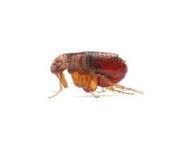Beware of Bloodsuckers!

Summer time is an optimal time to talk about our blood-sucking enemies, fleas and ticks. Keep your pets protected against fleas and ticks during the warmer months! For optimum protection against fleas and ticks, we recommend that you keep your pet on a monthly flea and tick preventive.
Did you know?
Flea season usually begins in May and lasts up until there has been a few good consistent “below-freezing” temperatures. The months of September, October, and November are generally the worst time of the year for fleas in Illinois.
Both dogs and cats can get fleas. So if you have an indoor/outdoor cat, it is highly recommended that she/he is on a monthly flea and tick preventive.
So How Does My Pet Get Fleas?
Many wild animals such as squirrels, raccoons, deer, small rodents, feral cats, and other wildlife can be infested with fleas. When these wildlife animals roam around in your yard- they can spread fleas to your and to your pet.
How Do Fleas Affect My Pet’s Health?
Fleas cause your pets to be extremely itchy, causing them to excessively chew and scratch at their skin. So flea bites can be painful!
In addition to making your pet feel uncomfortable, fleas can transmit intestinal parasites.Tapeworms are a type of intestinal parasite found in both cats and dogs who have ingested adult fleas after being infested by them.
Treatment for Tapeworms
If your pet has been infected with tapeworms, an oral medication can be prescribed by your veterinarian for treatment.
Fecal samples should be routinely performed at your pet’s yearly examinations to rule out tapeworms and other intestinal parasites. Although your pet may not exhibit any symptoms – you may be able to see tapeworms in your pet’s fecal sample, or your pet’s stool may test positive for tapeworms.
Flea Infestation
Since fleas have many life stages, it can be very hard to eliminate them once they have come in contact with your home. Flea eggs and larvae can hide deep within your carpeted areas and floor boards. It is recommended that if you have an infestation use a flea and tick preventative for at least three consecutive months.
How to Eliminate Fleas in Your Home
Read about it here, https://www.terminix.com/blog/diy/how-to-get-rid-of-fleas-in-the-house
Prevention
Flea preventives can help keep fleas from jumping, feeding, and laying eggs on your pet. We recommend the following flea/tick preventive options: Frontline Gold, Nexgard, and Bravecto.
Ticks
Did You Know?
In Illinois, the most active months for ticks are the months of April, May, and June. Winter months limit tick activity, However, ticks don’t die from the cold. Instead, they retreat daily into the leaf litter and climb back onto knee-high vegetation any time temperatures are above freezing. In recent years due to warmer weather, ticks have been apparent all year round.
Types of Ticks
The most common ticks found in Illinois are the American Dog Tick, the Blacklegged (Deer Tick), & the Brown Dog Tick.
How Does My Pet Get Ticks?
Many wild animals such as squirrels, raccoons, deer, small rodents, feral cats, and other wildlife animals can be infested with ticks. When these wildlife animals roam around in your yard- they can spread ticks to your yard and to your pet.
Even humans infested with fleas may transmit ticks to pets.
How Do Ticks Affect My Pet’s Health?
The bite site may be red and may cause itchiness and redness and inflamed skin. Ticks may cause paralysis from a neuro-toxin produced on the salivary gland of the tick. Lyme disease is transmitted by ticks. It is more common for dogs to get Lyme disease than cats.
Symptoms of Lyme Disease may include the following:
- Fever
- Loss of Appetite
- Fatigue
- Stiffness
- Swollen Joints
- Lameness, or limping.
Treatment for Ticks
If you see a tick on your pet- please call us to schedule your pet to be seen, so that we can determine what kind of tick, and so we can properly removed the tick from your pet. Your pet may need the tick removed and to get on a flea/tick preventive immediately if he/she isn’t already on one. It is possible that antibiotics may be started if an infection is suspected.
Treatment for Lyme disease requires a specific antibiotic. If you suspect that your pet has Lyme disease, please bring him/her in to your veterinarian, immediately for an examination!
Prevention
There are many tick preventives. Call South Town Animal Hospital for product recommendations. It is truly the best medicine for your pet to keep him/her on flea and tick prevention year round due to increasing global temperatures.




